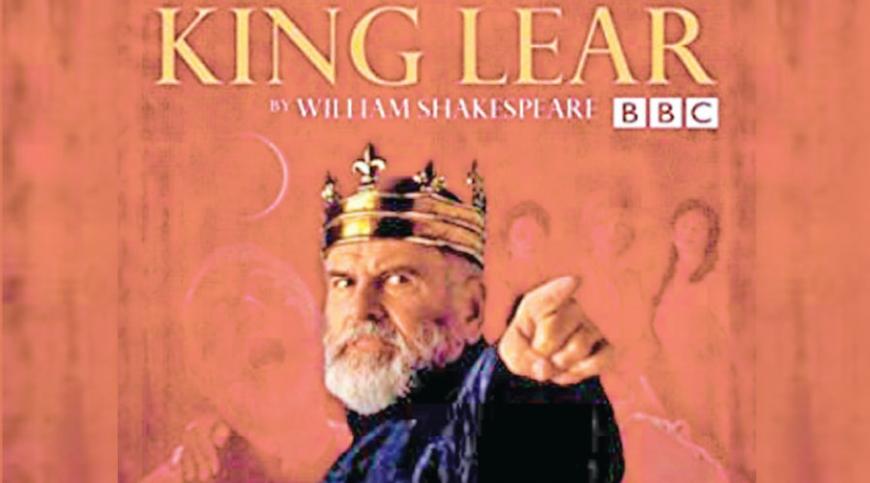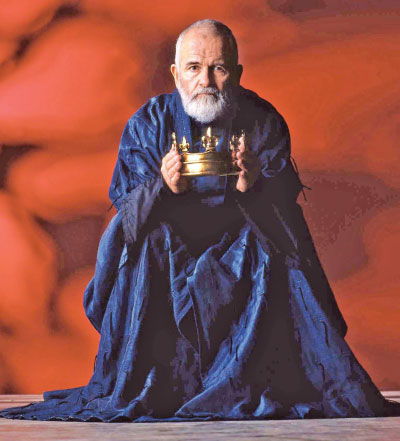
The BBC film adaptation of William Shakespeare’s King Lear is directed by Richard Eyre and stars Ian Holm as King Lear, Barbara Flynn as Goneril, Amanda Redman as Regan, Victoria Hamilton as Cordelia, Timothy West as The Earl of Gloucester, Paul Rhys as his legitimate son, Edgar, Finbar Lynch as his bastard son, Edmund and Michael Bryant as the Fool.
Shakespeare derived the plot of King Lear from Monmouth’s Historia Begum Britanniae. The sub-plot however was derived from Sir Philip Sidney’s Arcadia. Both plots explore the process of suffering and its fundamental cause, the origin and nature of evil in man and the existence of a destructive or benevolent fate. The protagonists in both plots are reduced to a state of isolation by their moral blindness. The metaphor of sight, of perception and blindness corresponds to the thematic concerns in the play which explore both Lear’s and Gloucester’s moral blindness. Gloucester however, fails to notice the obvious parallels between the King and himself.
The unique quality of Elizabethan tragedy arises from the discovery of the individual human character, its potentialities for good and evil, its corruptibility as well as its power to inspire. The Renaissance ideal of man is highlighted in Hamlet, Act 2 Scene 2:
Hamlet:“What a piece of work is a man, how noble is reason, how infinite in faculties, in form and moving how express and admirable, in action how like an angel, in apprehension how like a god: the beauty of the world, the paragon of animals.”
Lear’s banishment of Cordelia is unjust and in Act 1 Scene 1, Goneril says to Regan:
Goneril:“He always loved our sister most; and with what poor judgement he hath now cast her off appears too grossly.”
Lear fails to penetrate the hypocrisy of his elder daughters Goneril and Regan and banishes his most affectionate daughter Cordelia as well as his loyal counsellor Kent. Cordelia becomes a martyr to her own beliefs. Kent is the loyal servant who serves his master to the end even though Lear has banished him. The love test at the beginning of Act 1 Scene 1 propels the plot forward by exploring the extremes of love and anger. Lear’s demand that his daughters express how much they love him reveals his insecurity in his old age. The test seems to demand flattery as Goneril’s and Regan’s false professions of love make evident to the audience. In contrast to her sisters, whose professions of love are false, Cordelia does not try to flatter her father. She says, “Love, and be silent”. When her father asks her the crucial question with regard to what she can say to outdo her two sisters and receive the greatest inheritance, she answers, “Nothing, my lord”. This scene propels the plot forward because it triggers the tragic events which are to come.
The shift of the play’s focus to Gloucester and Edmund in Act 1 Scene 2 highlights the parallel between the main plot of King Lear and the sub-plot of Gloucester. Both Lear and Gloucester have Cordelia and Edgar who genuinely love them. But unfortunately they also have Goneril, Regan and Edmund, who are planning to harm them. Both their tragedies result from errors of judgement. Gloucester’s willingness to believe the lies that Edmund tells him about Edgar reflects a fear that his children secretly want to destroy him and take his power. Ironically, that is what Edmund wants to do to Gloucester, but Gloucester is blind to Edmund’s treachery. Gloucester’s inability to penetrate the truth corresponds with the discussion between Goneril and Regan at the end of Act 1 Scene 1, about Lear’s unreliability in his old age, the “infirmity of his age” and his “inconstant starts” reveal images of senility which suggest that they should take control from him, just as Edmund takes control from Gloucester.
Edmund is far more complex than the villains Goneril and Regan. His diabolical plots against his own father’s life are not only to inherit his wealth and property but also to gain power and recognition which were denied to him because of his illegitimate birth. At the beginning of Act 1 Scene 1, Gloucester mocks Edmund for being a bastard.
Gloucester’s rejection of Edgar parallels Lear’s rejection of Cordelia in. Act 1 Scene 1, and reminds the reader or spectator of the similarities between the main plot and the sub-plot. Cordelia and Edgar are both rejected by Lear and Gloucester due to errors of judgment. Gloucester says, “I never got him”, and thereby denies that he is in fact Edgar’s father just as Lear disowns Cordelia.
In Act 1 Scene 4, the audience is introduced to Lear’s Fool. In Act 2 Scene 2, the Fool is present but silent during the terrible scene between Lear, Goneril, Regan and Cornwall which precedes the storm and propels the plot forward. The importance of the Fool is made evident to the reader or spectator when Lear immediately turns to the Fool and says:
Lear:“You think I’ll weep;
No, I’ll not weep:
I have full cause of weeping; but this heart
Shall break into a thousand flaws
Or ere I’ll weep. O fool, I shall go mad.”
Lear’s cry of “O fool, I shall go mad.” foreshadows his fate that is to come. His words also recall the earlier scene in which Edgar decides to disguise himself as Poor Tom and assume the identity of a “Bedlam beggar”. Both Lear and Edgar escape from the safety of civilisation, to the chaos of the natural world. The symbolic significance of the storm and its connection to Lear’s state of mind and Shakespeare’s use of pathetic fallacy highlights the tension inherent in the characters’ emotional struggles.
The storm scene illuminates Shakespeare’s use of recurring imagery in King Lear. The chaos caused by the storm reflects the disorder in Lear’s mind and his inner turmoil, and the imagery signifies the projection of Lear’s rage and despair onto the external world. The chaos in the natural world also reflects the chaos in Britain due to Lear’s absence.
As the two parallel main and sub plots progress, the reader or spectator is given a glimpse into the despair in the minds of the characters. Edgar who wanders half naked sees his father blinded and bleeding from the eye sockets. Gloucester, who has resigned himself to his fate, expresses a similar feeling of despair in one of the plays most disturbing lines in Act 4 Scene 1:
Gloucester:“As flies to wanton boys are we to the gods;
They kill us for their sport.”
The theme of despair which is due to a cruel, indifferent and uncaring universe makes King Lear one of Shakespeare’s most disturbing tragedies. For both Gloucester and Lear on the heath, there is no possibility of redemption or happiness in the world. The lines spoken by Lear in act 4 Scene 7, makes this poignantly evident to the reader or spectator:
Lear: You do me wrong to take me out o’ th’ grave,
Thou art a soul in bliss, but I am bound
Upon a wheel of fire, that mine own tears
Do scald, like molten lead.”
Cordelia epitomises the redeeming quality of love in the play which moves from the extremes of hate to love when she says in Act 4 Scene 4: “love, dear love, and our aged father’s right”, and the audience is reminded of Lear’s cruelty towards her. Cordelia’s virtue and devotion is evident by her forgiving her father for his error of judgement. Shakespeare alludes to a Biblical passage when Cordelia says, “O dear father, / it is thy business that I go about” in which Jesus Christ says, “I must go about my father’s business”. The allusion to the Bible reinforces Coredlia’s honesty and purity and connects her with Jesus Christ, who was the martyr of love.
The plot structure in King Lear could be considered as the most important in all of Shakespeare’s tragedies because the sub-plot parallels the main plot and evokes pity and fear in the reader or spectator. The two plots are also used by Shakespeare to explore the despair that a cruel world inflicts on individuals. However, Shakespeare portrays both Lear’s and Glouscester’s downfall as being caused by a deficiency in their moral judgement which results in their tragedy. The BBC film adaptation of Shakespeare’s King Lear is well directed by Richard Eyre and Ian Holm, Barbara Flynn , Amanda Redman , Victoria Hamilton, Timothy West, Paul Rhys, Finbar Lynch and Michael Bryant give excellent performances.
